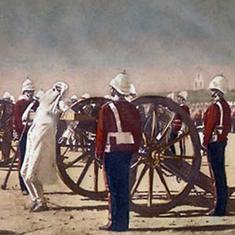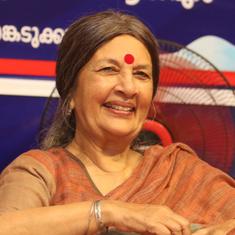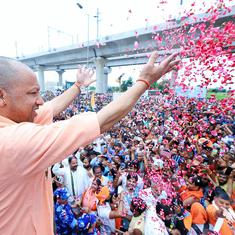On July 8, some participants in the Kanwar Yatra vandalised an eatery in Uttar Pradesh’s Muzzafarnagar as they found onions in their meals – a vegetable that is taboo during the annual pilgrimage to Haridwar to carry back water from the Ganga.
Shortly after, a woman travelling on the Haridwar-Rishikul Highway was dragged by her hair and beaten with slippers because her scooter accidentally grazed a pot that contained holy water.
These were only two of several instances of violence by kanwariyas reported during this year’s edition of the pilgrimage, which started on July 11 and ended on July 23.
The exercise by devotees of the Hindu god Shiva is not supposed to be only a physical journey – it is intended to instill spiritual discipline too. The pilgrims are expected to abstain from alcohol and avoid arguments or violence.
However, as these incidents show, the Kanwar Yatra in recent years has increasingly become a theatre of aggression. Pilgrims, clad in saffron, once walked in solemn devotion. But today, some wield hockey sticks and trishuls. They are often accompanied by trucks studded with loudspeakers that announce their presence in a manner that some would find alarming, if not threatening.
🎥#WATCH | 🔊 Decibel levels have shot up in the capital over the past few days as a steady stream of kanwariyas with boomboxes 📢 make their way through the city for their annual pilgrimage 🙏🛕
— Hindustan Times (@htTweets) July 23, 2025
🚨 Despite the noise levels exceeding permissible limits, the Delhi Police 👮♂️ and… pic.twitter.com/6dB8hKpE2l
Several people travelling or operating businesses on the Kanwar Yatra routes faced assaults by kanwariyas after petty disputes or inconveniences.
The state’s role is both silence and encouragement. This includes exempting participants from traffic laws, providing them with police escorts and showering petals on them. Though many officials view Muslims praying in public spaces as a nuisance, they have no hesitation lending a helping hand to kanwariyas.
This has created a culture of impunity that is so strong, even uniformed personnel were not spared. In Uttar Pradesh’s Mirzapur on July 19, a Central Reserve Police Force jawan was attacked by kanwariyas after a ticketing dispute. Though the assailants were arrested by the Railway Protection Force, they were released within an hour.
If the law enforcement officials can be targeted so brazenly, it suggests not just loss of control but a deeper cultural shift – the belief that faith grants immunity and that public infrastructure will bend to the might of politicised faith.
After all this, when the state responded, it did so in a manner that was predictably performative. Uttar Pradesh authorities eventually banned trishuls and hockey sticks on the route and issued belated warnings against violence. Though some FIRs were filed, such legal action did little to inhibit such behaviour.
Each of these incidents weaves a larger story where acts of faith have been repurposed as performances of domination and creating spectacles of humiliation, especially for minorities.
Needless to state, the intent of the Yatra is not aggression. But a few miscreants have muddied perceptions of the whole Yatra.
An additional challenge was thrown up this year by a directive from the Uttar Pradesh authorities requiring vendors and shop owners to display QR code stickers outside their shops. These codes were purportedly linked to a food safety app that revealed the names and religious and caste identity of the owners.
The religious identities of stall owners along the route of the Yatra has often been the cause of conflict. Kanwariyas have been known to boycott Muslim vendors or even attack them.
Though the directive on the QR codes was challenged before the Supreme Court, the judges refused to examine the legality of the order. Instead, they reiterated that vendors must display their licences and registration certificates as required by the law.
Pintu, a worker washing dishes at a dhaba in Muzaffarnagar, was assaulted so brutally his leg broke.
— newslaundry (@newslaundry) July 12, 2025
The reason?
A piece of onion accidentally landed in a meal ordered by a kanwariya.
Watch @anmolpritamND's report on how faith is being weaponised: https://t.co/Cm3Tt2Cayr pic.twitter.com/zsRDy8VXmD
Ironically, the Supreme Court last year had stayed similar directives by Uttar Pradesh and Uttarakhand requiring owners of eateries to display the names of their owners and staff.
Such disclosure not only violates the right to privacy but also the bundle of rights related to the protection of life and personal liberty guaranteed under Article 21 of the Constitution.
The Supreme Court’s reluctance this year to examine the legality of the directive on QR codes leaves the door open for future abuses. This order, like last year’s directive on names, lacks legal basis and perpetuates a climate of fear.
The Kanwar Yatra’s devotees undeniably have the right to eat and shop at establishments of their choice – but not at the cost of forcing shop owners and staff to disclose their identities, especially amid recurring violence. When two rights clashes, the solution lies in equilibrium and upholding religious freedom while safeguarding privacy and dignity.
The state must ensure that logistical measures for the Yatra do not morph into instruments of profiling or intimidation. Until then, such directives will remain not just legally untenable but socially corrosive, undermining the pluralism the Constitution seeks to protect.
While many still uphold the Yatra’s true spirit – offering food, shelter, and flowers to pilgrims – the rising violence tarnishes its sanctity. A visible minority has hijacked perceptions of the event. The state’s failure to curb this aggression risks normalising faith-based vigilantism, eroding the very pluralism the Constitution seeks to protect.
Sociologist Santosh Singh has rightly argued that the Kanwar Yatra was a path of penance and pain, not spectacle and violence. “Today, are we even listening to our gods and what they signify in essence?” he wrote in The Indian Express.
The Kanwar Yatra must return to its roots – a journey of discipline, not domination. The state must enforce the law equally, ensuring that no religion enjoys a free pass for violence. Civil society, too, must resist the politicisation of faith and uphold the true essence of devotion – peace, humility and respect for all.
Otherwise, what was once a sacred pilgrimage risks becoming an annual ritual of fear and division.
Areeb Uddin Ahmed is an advocate practicing at the Allahabad High Court. He writes on law and courts. Nishat Anjum is pursuing masters from Jamia Millia Islamia in MA Conflict Analysis and Peace Building. She is a former journalist with Informist Media.










